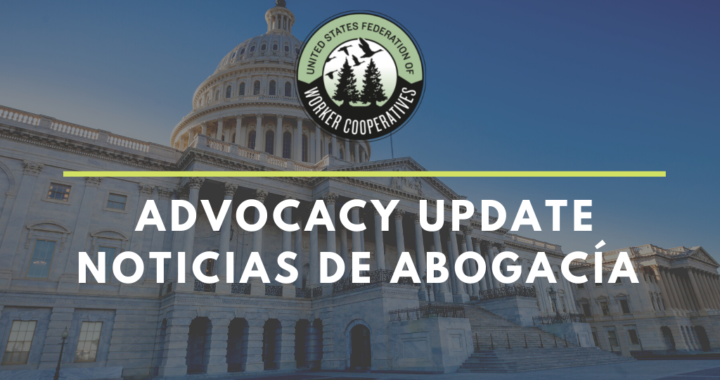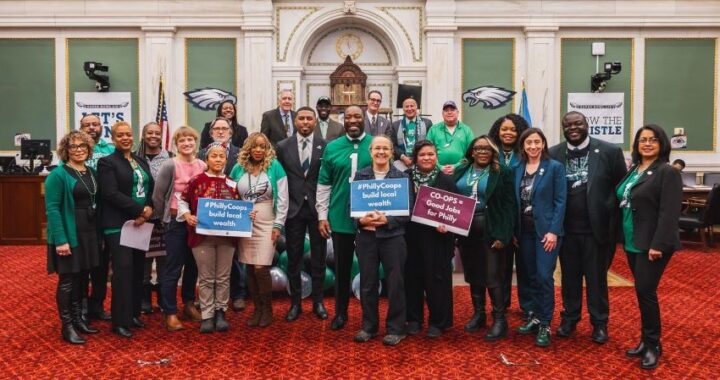The USFWC applauds Rep. Velázquez (D-NY) and Rep. Phillips (D-MN) for introducing two important bills that fulfill the intentions of the Main Street Employee Ownership Act (MSEOA).
In 2018 the USFWC, alongside many of our co-op and ESOP partners, advocated for the passage of the MSEOA, aiming to address challenges for worker owned businesses in accessing Small Business Administration (SBA) lending programs. Worker-owned businesses have historically struggled to access financing through SBA programs. For example, SBA’s flagship 7(a) loan program requires a personal guarantee from any individual or entity owning a 20% share or greater of a business, which is not feasible for employee-owned firms, given their broad-based ownership structure.
The MSEOA was meant to ensure equitable access for cooperatives and ESOPs. However, the SBA has not taken action to see the goals of the Act through. Despite having a wider base of highly invested owners, cooperatives and ESOPs continue to face barriers that exclude them from accessing capital, disaster assistance, and training opportunities.
The Main Street Employee Ownership 2.0 Act of 2022 and the Improving SBA Engagement on Employee Ownership Act are two new bills aimed at bringing to fruition the intent of the original MSEOA. Rep. Velázquez and Rep. Phillips, through the advocacy of the USFWC and partners including NCBA CLUSA and NCB, recognize the need for explicit directives to ensure the SBA creates clear pathways for cooperatives to access vital resources from the administration:
- personal or entity guarantee for a 7(a) loan, and from requiring the seller of a business being purchased with a 7(a) loan for conversion to employee ownership to provide a seller guarantee for the loan.
- makes cooperatives explicitly eligible for SBA’s Disaster Assistance programs
- includes SBICs in the outreach and education requirement of the Main Street Act
- requires SBA to attend all employee ownership or cooperatives-focused working groups or other engagements hosted by other federal entities
“As small businesses feel the long-term effects of COVID and owners nearing retirement, it’s crucial that we look toward durable business models that keep jobs rooted in our communities. Worker ownership is an investment in people who have a deep commitment to their workplace, securing their jobs and building wealth. When workers benefit from the value they are creating, everyone wins.” said Mo Manklang, the USFWC’s Policy Director. “These two bills will provide access to SBA programs for a sector that has been historically underserved, providing access to funds and resources that all small businesses should enjoy.”
“Employee-owned businesses have a proven track record of aligning the interests of workers and owners. Often, when a business embraces employee-ownership wages rise, the local economy gets a boost, and job security increases,” said Chairwoman Velázquez. “These businesses deliver a range of benefits to their workers and communities and they must have ample and equal access to SBA programs. The bills introduced today will help lower barriers to accessing capital and ensure that employee-owned businesses aren’t unfairly excluded from critical programs.”
“With each passing day, small business owners across the country are nearing retirement with limited options on what’s next for their firms. Rather than closing their doors or turning to options that hurt workers, local communities, and competition, owners can choose to leave their businesses in the hands of the people who know it best – their employees,” said Congressman Phillips. “Propelling employee ownership will help sustain an economy that protects local jobs and builds resilient small businesses.”
More information about these two bills:
The “Main Street Employee Ownership 2.0 Act of 2022”
H.R. 9347 Introduced by Chairwoman Velázquez and Rep. Phillips
The legislation prohibits SBA from requiring cooperatives to provide a personal or entity guarantee for a 7(a) loan, and from requiring the seller of a business being purchased with a 7(a) loan for conversion to employee ownership to provide a seller guarantee for the loan. The legislation also requires SBA to permit 7(a) lenders in the Preferred Lenders Program to process 7(a) loans to ESOPs using their delegated authority. Furthermore, the legislation eliminates the requirement that ESOPs provide any mandatory equity, submit an IRS determination letter, or provide a second valuation if a primary valuation was already obtained to get a 7(a) loan. Finally, it makes cooperatives explicitly eligible for SBA’s Disaster Assistance programs.
The “Improving SBA Engagement on Employee Ownership Act”
H.R. 9345 Introduced by Rep. Phillips and Chairwoman Velázquez
The legislation would improve SBA’s outreach and engagement on employee ownership and cooperative development by including SBIC limited partners and sponsors of SBIC funds in the outreach and education requirement of the Main Street Act. It also would require SBA to attend all working groups or other engagements hosted by other federal entities with respect to employee ownership or cooperatives.
Sign on to support the Main Street Employee Ownership 2.0 Act of 2022 and the Improving SBA Engagement on Employee Ownership Act

